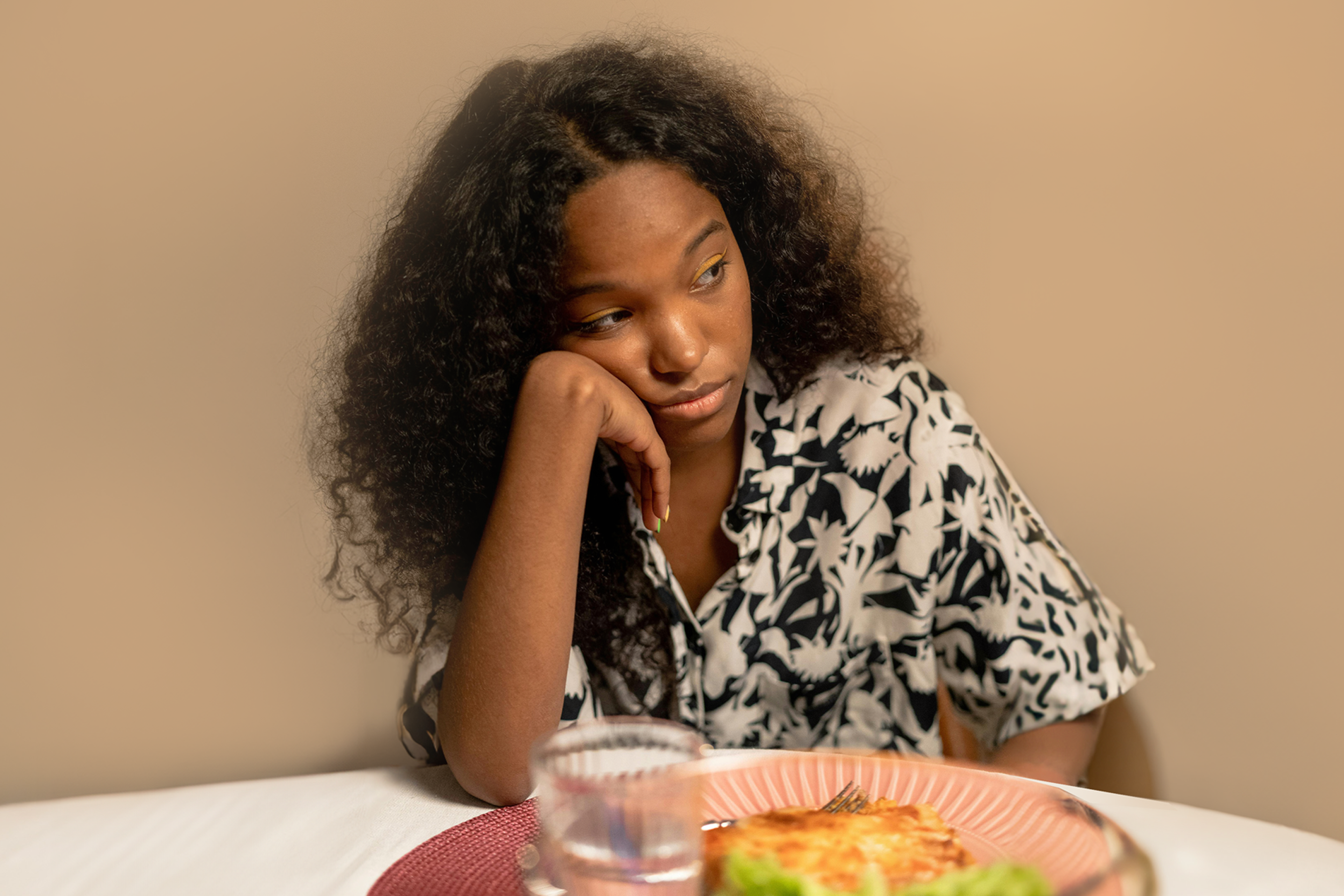

- It can be hard to help someone with an eating disorder, but the intervention of loved ones is essential. Many people with eating disorders won't seek help on their own.
- There are things you can do to more effectively help a loved one, such as educating yourself, exploring your own internalized beliefs, including them in activities, and setting reasonable expectations and healthy boundaries.
- Getting a loved one into eating disorder treatment can take time and patience. But if your loved one is medically unstable or at risk of imminent harm, it's important to seek immediate medical attention.

When someone you care about is struggling with an eating disorder, you may notice a change in their eating habits, body, or behavior and want to help them. But helping someone with an eating disorder can be easier said than done—you may not know what to say or do, or even if you should intervene at all. The truth is, there’s not one specific way to help someone who is dealing with an eating disorder, and determining your next steps is rarely straightforward.
Despite this, your support is essential and may even be lifesaving. Research shows that doctors may not recognize what is going on, which can lead to delayed treatment, and eating disorders are the deadliest psychiatric illness outside of opioid abuse. To make things more difficult, eating disorders are self-protective: they often convince the person struggling that nothing is wrong, they don't need treatment, and that the eating disorder is part of their identity. This makes them unable to recognize or acknowledge their own illness.
Because of these factors, the intervention of family and friends is often the turning point to get someone into treatment and onto the path toward recovery. If you don't feel equipped for this role, read on. There are concrete, meaningful ways you can support someone with an eating disorder beyond just talking to them about it. From validating their feelings to continuing to invite them out to setting your own boundaries, the actions you take can make a real difference in their journey toward healing.
How can I tell if someone I care about has an eating disorder?
It can be difficult to know whether what you've noticed in your loved one is cause for concern or not. Eating disorders show up in different ways for each person and thrive in secrecy, plus many disordered behaviors are considered “healthy” in today's diet culture. Still, some common red flags, including early signs and subtle signs of eating disorders are:
- Weight changes, either up or down
- Starting a new diet or other consistent change in their typical eating behavior (such as cutting food into tiny pieces or eating large amounts of food in a short period of time)
- Anxiety over social events that involve food
- No longer eating around others
- Inflexibility around exercise, like working out when sick or turning down plans to exercise
- Rigid rules about eating, which cause distress when broken (for example, if a parent buys the “wrong” brand of snack bar or a restaurant forgets to hold the cheese on their sandwich)
- A preoccupation with body shape and size
- Body checking, or compulsively checking their weight or other external markers of their size and shape
- Cooking or baking for others but not eating the food
- Personality changes
- Social withdrawal
You can also use Equip's free, five-minute screener to help determine if your loved one is struggling. Above all, trust your gut. If something seems off in someone you know and love, it probably is.
How to help someone with an eating disorder: 11 tips
Helping someone with an eating disorder can feel overwhelming and scary, but it’s an important and compassionate act—and your loved one may be more receptive than you assume they’ll be. “Sometimes we worry about overstepping, or saying something we're not supposed to say,” says Jen Simmons, PhD, LPC, Equip Lead Therapist. “But if someone is struggling with anything, sometimes they're afraid to ask for help. Support makes a world of difference.”
So go ahead and take the initiative. Whether your loved one is not yet in treatment or has already started seeing a team, these expert-endorsed tips can help you help them along every step of their journey to recovery.
1. Educate yourself
Using a reputable source, such as FEAST (Families Empowered and Supporting Treatment for Eating Disorders), Equip, or the Academy for Eating Disorders, learn about eating disorders so you can better understand what’s going on with your loved one. Then, if you have the time and space, connect with other families who have loved ones with eating disorders. Since they’ve been through this or are going through it, “they can provide a lot of good information,” says J.D. Ouellette, Equip’s director of Lived Experience. Having a better understanding of eating disorders and what’s happening in your loved one’s brain and body will set you up to provide thoughtful, sensitive support.
2. Explore your own thoughts and feelings about food and body size
“This is critical. We all live in diet culture. It's the sea we swim in,” Ouellette says. “And once you do this, it provides another source for connections and conversations.” You can tell your loved one, “These are things I've thought as well.”
To help you explore your internalized beliefs about food and bodies, consider taking Equip's free Freeform body image program. You can also turn to books, podcasts, or social media; searching for terms like “weight neutral,” “healthy at every size”, and “body image” should guide you to resources that don't reinforce diet culture tropes, Ouellette says.
Also pay attention to when you get the “ick” feeling, Simmons suggests. Maybe you feel uncomfortable when someone else has two servings of dessert or tells you they had to go up two pants sizes. “If anything food-related is causing distress, get curious. What is it about this that's making you uncomfortable? If you went up two sizes, what would come up for you?” Simmons says. “It's going to take time to challenge these thoughts,” she adds. “You're going to need to do a lot of work, and you might fail at first because this is new. It may also bring up other things. Compassion is super important.”
3. Validate their feelings
You can let your loved one know their feelings are reasonable and, at the same time, encourage treatment. It's all about the power of “and,” Ouellette says. You can validate, “I see this is a really hard conversation for you. It's stressing you out. It's a really tough thing,” and then add something like, “and I really feel the need to call out what I'm seeing, and I'm doing it out of love.”
As long as you connect your validation—”I know it's probably really upsetting to have me comment on these things”—with the next step you'd like them to take—”and I love you and I want to support you,” then you're balancing making your loved one feel heard with making your wishes known, Ouellette says.
4. Ask what they need
You can't guess what your loved one needs, and their needs will likely shift from day to day. So ask them what would be supportive or helpful. This could be a wide variety of things, like having a weekly meal with them (either in person or via FaceTime), helping them with grocery shopping, doing gentle exercise together, or simply checking in with them regularly.
And if you notice they're struggling in the moment or something feels off, get curious. If you're out to dinner and they ordered but aren't eating, you could say, “What's going on today? Are you having a hard moment?” Then, gently questioning their assumptions—“Why can't you have pizza?”—may help them see that this is challenging for them. “They might not have put it together that it is an eating disorder,” Simmons says.
5. Suggest small ways you can help
Some people with eating disorders may not know what they need. In these cases, it may be helpful to offer some suggestions. This could include:
- Inviting them out to an ice cream date, just the two of you, and they can bring their own food
- Inviting them to dinner and, if they're scared to order, have them pick out their option ahead of time and you order for them
- Offering to attend a therapy session with them
- Researching possible providers
- Booking their consultation call with Equip
6. Accept that you cannot "fix" the eating disorder
“You're not a trained therapist, so you probably don't know what to do. And that's okay,” Simmons says. “You're not here to fix it, you're here to support your loved one.” Let their treatment team help them take steps toward recovery, and you focus on how you can be there in ways that professionals may not be able to, since you know your loved one on a different level.
7. Invite them
Eating disorders tend to be very isolating, often due to low self-esteem and the secretive nature of these illnesses, as well as fears of eating in front of others. Still, invite your loved one to all of the things you normally would ask them to attend, even if they keep declining. “Let them know they are welcomed, valued, and loved,” Ouellette says. “Inviting them lets them know that you're there for them, even if the eating disorder may make them say no to you.” Continuing to show them that you care about them by extending invitations means that when they are ready for help, they’ll be more likely to reach out to you.
8. Let them know they're worthy
If someone has low self-esteem, the eating disorder can collude with that and tell them that they're only cared about because, for example, they're a good runner—and if they're no longer a good runner, people won't love them anymore. Of course this isn't true, but they need to be reminded about their inherent worth.
So rather than talking to your loved one about their potential or what they can do, talk to them about being worthy because of who they are, Ouellette recommends. This may sound something like, “I've always loved spending time with you,” “You are so kind,” or “Your warmth has always helped me.”
9. Manage your expectations
Helping a loved one seek treatment often takes multiple conversations and, in the case of adults, you need to respect their autonomy. Once a person does enter treatment, eating disorder recovery is a long-term process that takes months (or sometimes years) and involves both progress and setbacks. This is why it's important to educate yourself so you know what you're getting into and can manage your expectations. Know that your help and support is extremely important, even if it doesn’t lead to immediate changes.
10. Know that it's okay to save yourself
If your loved one is an adult, there's only so much you can do to try to motivate them to seek treatment. “If you can help your loved one, they're willing to accept help, and it's working out logistically, put everything into it,” Ouellette says. On the other hand, if you've put every effort into helping them and they haven't changed, as difficult as it may be, recognize when you've done enough..
Part of this involves establishing and respecting your boundaries. If you can figure out how you want to live and have a conversation with your adult loved one about that—expressing, “This is happening in our home and our life. I want to help you, and these are the ways your behaviors are impacting me, and I have to consider that as well”—that often is the thing that pushes someone to seek help, Ouellette says. To be clear, this isn't an ultimatum: you are conveying how you wish to live and that you want them to be part of that. Talking to a therapist who understands eating disorders and others who have dealt with this can help you set healthy boundaries while still being there for your loved one when they’re ready to make a change.
11. Realize that setbacks and relapses are likely to happen
Once your loved one enters treatment, no matter their age, they may make great progress...and then take some steps, or even some leaps, backward. Eating disorder relapse is a common part of the journey to recovery. “It's not that your loved one 'didn't want it enough' or that they like living like this,” Ouellette says. “It's just the nature of the illness. It's very hard to treat.”
If you spot any warning signs of relapse, don't panic. Instead, speak up immediately, before the eating disorder takes back too much power. “The earlier you say something, the more likely their brain is going to be in a place to receive it,” Ouellette says. You can say something as simple as, “It seems like you're struggling with dinner a lot more than you used to. When things were going better, we would play a game at the table. Do you want to do that again?” Remember: You know more than you used to know. Use that insight to help your loved one get back on track.
What to do if your loved one needs immediate help
If your loved one is medically or psychologically unstable, seek immediate medical attention at your local hospital. Determining if someone requires hospitalization often calls for checking their vitals or lab work. Signs to watch for include:
- Severely low heart rate
- Abnormally low blood pressure
- Dehydration
- Electrolyte disturbance
- Uncontrollable bingeing and purging
- Fainting
- Seizures
- Very low weight
- Suicidal ideation
- Self-harm behaviors
“If you suspect someone might have an emergency, do your homework in advance,” Ouellette recommends. “Our system comes with many limitations and a lot of lack of understanding.” Look online or join local support groups to find which hospitals near you are educated about eating disorders and will perform the right tests to determine if your loved one should be admitted. Otherwise, you risk being turned away, and that may reinforce your loved one's belief that they don't have a problem.
On the other hand, if your loved one is medically stable and not in imminent risk but their eating disorder symptoms are severe, contact an eating disorders professional as soon as possible. You can always schedule a call with Equip to determine if your loved one has an eating disorder and if our program is right for them.
The Equip takeaway: Key points about helping someone with an eating disorder
Helping someone with an eating disorder isn't easy, but it's worth it. Many people are scared to ask for help, and your support may be just the thing they need to seek treatment. “There is a path forward. It won't be easy, and a lot of things in life aren't easy. We can do hard things,” Ouellette says.
If you notice any warning signs of an eating disorder, speak up and encourage professional care. Whether or not they take your advice, be there for them. This can mean educating yourself about eating disorders, validating your loved one's feelings, suggesting ways you could help them, letting them know how much they mean to you, and being prepared for relapses. However, if your loved one is in danger medically or psychologically, get them to an emergency room for immediate care.
FAQ
What should I do if I’m worried someone I love has an eating disorder?
If you're worried a loved one may have an eating disorder, first educate yourself about eating disorders by checking out authoritative sites like FEAST (Families Empowered and Supporting Treatment for Eating Disorders), Equip, and the Academy for Eating Disorders. When you decide to talk to them, follow these tips, which can help you find the words to express your feelings during a challenging conversation. Lastly, encourage them to seek professional care, perhaps offering to help them find a provider or go to an appointment with them.
Do eating disorders ever go away on their own?
No, eating disorders do not go away on their own. They are serious, brain-based mental illnesses that require professional support and intervention. At a minimum, this includes a therapist, who can help the patient work through the mental aspect of their disorder and learn skills to better cope with challenges; a dietitian, who can help with meal planning and making sure the patient is giving their body everything it needs; and a medical professional, who can monitor any physical health complications.
How can I help get an adult into eating disorder treatment?
You cannot force an adult into eating disorder treatment (unless they pose harm to themselves or others). You can, however, talk to them, focusing on your objective observations related to their disordered behaviors. Listen without judgment and express empathy for their feelings so they feel understood. If possible, find some common ground you can agree on, and then work with them to find a treatment plan they are open to trying.
What can I do if my loved one denies they have an eating disorder?
It's common for people who are struggling to deny they have an eating disorder. One reason is that the illness often involves anosognosia, a condition where a person doesn’t realize they’re ill. “For many people, it's not denial. It's that their brain doesn't recognize it,” Ouellette says. In other instances, a person may simply not want to get better (this is because eating disorders are self-protective, and when they are in control, they can convince the person affected that the illness is a good thing). Whatever the case, when you talk to your loved one, be open and honest, pointing out the specific behaviors you observe and expressing your concerns. “It's harder to say objective things aren't happening,” Ouellette explains.
- Tse, Angel, et al. “Challenges in eating disorder diagnosis and management among family physicians and trainees: a qualitative study.” Journal of Eating Disorders vol. 10 (2022):45. doi:10.1186/s40337-022-00570-5
- Lubieniecki, Gabriel. "Perceived clinician stigma and its impact on eating disorder treatment experiences: a systematic review of the lived experience literature." Journal of Eating Disorders vol. 12 (2024):161. doi:10.1186/s40337-024-01128-3







